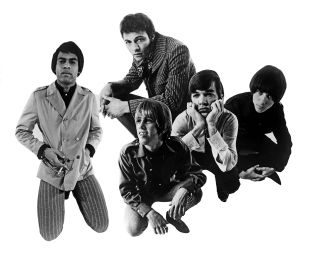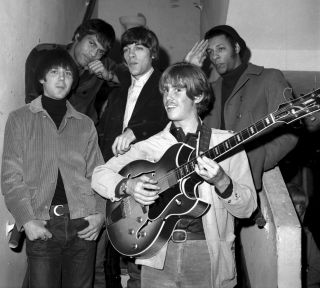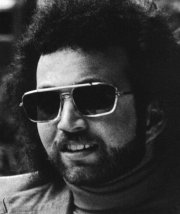Recently I’ve started taking these walks around Laurel Canyon. I take a portable CD player and headphones and listen to the classics – Love, Byrds, Procol Harum, Traffic, Moby Grape – and pretend it’s 1969. A few months ago I went online looking for Love CDs, and found this page that talked about frontman Arthur Lee’s illness and these benefits that were being conducted in his honour. If you wanted, you could send in a donation. So I sent in $100. Nothing really, but I loved his music so much I wanted to do something.
There was a contact name on this web page, so I emailed this guy and apparently he was Arthur’s friend and guardian. I told him the story of how I’d interviewed Arthur back in 1975, how much I loved his music, and so on.
He said he thought Arthur would really dig listening to the interview; could I make a copy and send it along? So I burned a CD copy of the entire interview – about an hour and a half – and sent it to him. A couple of days later this guy writes back and said Arthur listened to it and really dug it and had said that he’d been particularly open with his interview with me that day. A month later Arthur Lee was dead.
The interview was for Rolling Stone but it was never published; they ran a news story instead.
Back in 1975, Arthur Lee, gangster of love, had come bopping through the conference room doors of RSO Records, head shaved, clothes mildly unkempt, with a moustache on his upper lip. His thoughts came out in staccato bursts: part hustler, part hipster. The eyes were narrowed and a sneer played upon his face. He was back to promote Reel To Real, the first Love album in four years and the final Love album for nearly two decades. Arthur was not high but he acted like it. His head darted back and forth and he tended to mumble beneath his breath. His body coiled and uncoiled as if preparing to strike. Out of nowhere, he addressed the tape player on the table before him: “I don’t like violence but I love to fight,” he said.
For the next 90 minutes he did wage a sort of personal battle, calling up all the old demons – former bandmates, publishing companies, managers, record labels and trying in vain to exorcise them. When he sat down he emitted a mad cackle – the first of many. It was startling in its intensity, and served as a warning sign for areas he wouldn’t talk about. When Arthur laughed, there was nothing funny about it.

Would you mind going back and talking about how you first got into music and the LA scene?
No, I don’t mind going back at all, man. My aunt used to take me around the beer gardens, man, when I was about four or five years old. That ain’t how I got into it, but that’s one of the things that had to do with it. Fuck, man, I dug music from as far back as The Hucklebuck [an instrumental song from 1949 that made it to No.1 in the US R&B chart]. Man, doing the Hucklebuck! The Sh-Boom, you know? It just rang bells in my head. I said: “Wow, man. I think I can do that!” But I didn’t know how to go about it. You know, if you’ve got a talent it’s one thing, but you’ve got to know the person to put you on the stage to perform your talent. And that’s been my problem ever since I started.
What was your first band?
My first band started at Dorsey High School. I had a school basketball record while I was there. Arthur Lee! I like sports, man. I like livin’, ya know. Good trip. My first band was with Johnny Echols. That’s that cat who’s on [Love’s] Forever Changes album. We went to school together and he had a band. I was playing congos, or congas or whatever you call them, at the time and a little accordion, a little piano. [Keyboard player] Billy Preston went to Dorsey, too. Probably a lot of cats and musicians that went to Dorsey, man. Pete Townshend… Ed Townson… what’s that cat’s name?
Check this out. I don’t give a fuck what he says; I mean, this interview could go round the world, man. But the truth is the truth. This dude used to be a janitor and also an athletic groupie. And now he’s with the Fifth Dimension. You know the heavy-set guy in the Fifth Dimension? What’s his name? Ron Townson [Writer’s note: Ron Townson was indeed in The Fifth Dimension]? Pete Townshend? Eric Townshend? Yeah, me, him and Billy, man! We all went to Dorsey. Well, he didn’t go to Dorsey, he was the janitor there. I was stealing lunches and he was sweeping the floor. It cracked me up!

Did you ever play with Billy Preston?
Billy? No, man. Billy always seemed like… Well, we were two different types of people. He’s got his thing and I’ve got my thing. And I’m glad of that. It’s a negative and positive world, so that makes sense.
When did the wig thing begin? (Arthur started going bald in his 20s, and wore wigs ‘in tribute’ to the long hair of the hippies.)
When I saw Mick Jagger on TV; it was The Red Skelton Show, the first time The Rolling Stones ever played.
What was it about seeing Mick Jagger that so moved you?
No, it wasn’t Jagger, actually. It was a cross between Jagger and Jimi Hendrix. I started working on it when I was at my girlfriend’s house one day. All of a sudden, man, I turned around and there’s this car accident and [the driver’s] leg is all fucked up and these guys are driving by, and they jump out of their car. And the guys that jumped out of the car were The Valentinos – Bobby Womack? The Valentinos? And they had hair as long as you in 1963 [Writer’s note: I had long hair in 1975]. I looked at it and I looked at their heads and their hair and everything. “Something must be happening here! I don’t know what it is.”
And the next thing I know I saw Jimi Hendrix going in The California Club over on Western and Santa Barbara. It was called California Club then. Well, he was walking in and he had a hoodoo priest suit on, man, and some shoes with runned-over heels. And I was walking right behind that dude and his hair was real long. You know, “Whoa! There must be something in this trip!”
So I put a wig on, man, right there in Montebello, and start singing Beatle [sic] and Rolling Stone [sic] and ‘oop oop a doo’ and all that shit, funky.
And the next thing I know, man, I go to Ciro’s and The Byrds are playing there. And I bumped into Brian Jones of The Rolling Stones and he looked at me, he couldn’t believe it, I don’t think. I looked at him and I know I wasn’t believin’. Then the next time I saw Jim [aka Roger] McGuinn and The Byrds and those guys.
Like, the music in my head that I had in the back of my head [whistles high to low] – way in the back – I knew I could do the things that I saw The Byrds doing at Ciro’s. Packin’ the house every night, all these people jumping up and freaks flying around and carrying on. So, man, you know, I jumped on the wagon because when they left they left a huge following of people here. So I didn’t get my trip from The Byrds, but they was a big influence on the first Love album, you know what I mean? But see, I was hungry, man. I said: “I’ll go around and I’m gonna do this thing until I’m capable of doing my thing.”
What about your relationship with (Love guitarist/songwriter) Bryan MacLean?
You mean the last time I saw him? To get to my pad you’ve gotta go through two gates: bottom of the hill, and then you get to the top of the hill you go to another gate, right? This dude jumps over the gate, goes past my guard dogs – so-called guard dogs – jumps in the motherfuckin’ window, man, and wakes me up. My bodyguard or whoever is sleeping on the couch. I said: “Who let you in, man?” He says: “Nobody, I came through the bathroom window.” “Who the fuck are you? Joe Cocker? You know, I haven’t see you in 10 years, man! [Laughs]. Well, okay, that’s cool. But just don’t do it again.”
Next thing I know, whammo, he’s jumping the fence again. So the last time I saw Bryan I slapped him. Not hard. I missed. As a matter of fact I fucked up my hand, but I guess it was meant to be, because where is violence anyway? That’s nowhere, unless you want to off somebody! [Laughs]
He made some good music with you, though.
He did. He was a great musician, great writer. It’s too bad he doesn’t know it. That’s the only thing that’s wrong, man. Like I was telling you – I don’t know if I was telling you or the guy that was interviewing me a little while ago – you gotta know the person to put you on stage and do your thing. You’ve gotta know somebody to get to where you wanna be.
How did you get together with Jimi Hendrix?
He played on a record called My Diary. This chick’s mother found her diary, and I was fucking the shit out of this chick for a year. She wanted this chick to be with a lighter-skinned black dude with the straighter hair. And she found her diary: ‘And we fucked in the alley and fucked in the streets/Then we got somethin’ to eat.’ But it really broke me up when she found out about the diary bit. [Sings] ‘Why did my mother find my diary!’ And Jimi’s [sings guitar lick]: ‘Doo-doo-doo, doo-dedoo-doo…’ Yeah! Yeah, man, that’s how I met Jimi Hendrix.
And then the next thing I know I’m playing at the Fillmore West. And like everything is peace, love and acid tests and all that shit. So I go there, man, and I’m peace, love, you know, and we’re playing and we’re getting standing ovations. And the second billing is a group called Grateful Dead. I’m in the bathroom and I’m combing my curlies, straightened hair, making sure that my triangle glasses are on straight and my pants are crooked and the zipper’s open [laughs]. And this cat Pigpen from The Grateful Dead came in and said: “Hey, you know something, man? I heard that people that wear triangle glasses usually have triangle heads!” And I said: “Hey, right on, man! Peace. Love.” Then I went into the other room and I thought about it [laughs].
He’s dead now. That’s a trip, man. I had nothing to do with it, but anyway he was a trip. You get so hung up, and that’s what you get for getting hung up and going down one street too fast. Because there’s always something coming on the other side, you know what I mean? I ain’t got no racial problem, man, at all. I’m just prejudiced [laughs].
Did you and Jimi ever talk about putting a band together?
Yeah, we were gonna start a band. He wanted to use Stevie Winwood. And there’s a dude, his name is Remi Kabaka [percussionist]. He played with Ginger Baker’s Air Force. He’s got his own band now. I just got back from London and he was over there… What was the question?
How you were going to start a band with Jimi.
It was gonna be called Band Aid. You know what I mean? That was Jimi’s idea. But he died, so fuck it. The name was still cool.
- The rise and fall of Tower Records, the major chain it was OK to love
- Jimi Hendrix: The Last Interview
- The Man Who Inspired Hendrix: The Crazy World Of Arthur Lee & Love
- The tale of David Peel, the dope-smoking hippy who became the King of Punk
Do you remember where the name Love came from, for that band?
It was immediately after I heard that someone ripped my name off – The Grassroots. But I think the reason I called the group Love was because rather than hate somebody for stealing something from you, man, maybe you should love them. It would be a different approach to the whole trip. You dig it? So that’s how I got the name Love. I was riding on the freeway, trying to think of another name. “Well, Grassroots is gone… Call it Love.”
Did you have any other names that you were thinking about?
The Farts! The Farts was always a gas!
There were 14 songs on the Love album, which was pretty remarkable at the time (1966)
There could have been 20, man. At least. It was the first album, man. I had written all these fuckin’ songs, gone around to all these fuckin’ record companies. And every time I got turned down or somethin’, every time I went through some so-called bummer, man, I tried to write somethin’ good to overcome the bad feeling that I got. I wrote Andmoreagain [from Forever Changes] like that for sure. Here I am, upstairs, with a chick that I dig, and the next thing I know Bryan’s fucking her downstairs [laughs]. There’s “And more again”, and more and more and more and more, again and again and again. Fuck it. It’s cool.

Love’s third album, Forever Changes (’67), is kind of a big jump from Da Capo, the second album.
To you. I can understand how you can say that, and other people. To me, I’ve never had a big jump. I’ve never jumped big at all. I’m not meaning that I haven’t done a big thing or anything, but I mean the way you said that…There were more instruments, and I think the songwriting itself had progressed.
I had to try it out. I was feeling my way. Like from the first album, if they dig that then maybe I’ll get a chance to do another album. Then maybe I’ll get a chance to do my thing. My thing was the Forever Changes album. That’s when I finally got a chance to do my thing and I wasn’t worried about whether the public was gonna buy it or whatever.
Forever Changes took a while to record. Were the band doing much touring during that period?
We weren’t doing anything, but we were up and down the west coast. What they wanted us to do was go and eat shit. I just wasn’t going for it, because I had my $50 a month pad, I was eating every day. And I just didn’t see why I had to go out on the road and eat shit. I always thought that if something was good, it would get through anyway, whether you went out on the road or not.
There’s a guy, Barry White. How many times has he been out on the road? Next thing you know he’s playing at the Hollywood Bowl! Now, I don’t know how many people came or what, but I know that the dude ain’t no work-at-the-Whiskey-six-months-and-then-go-to-the-Troubadour. But he’s selling, he’s got the number one record now and he’s doing all this shit now. That’s why I thought it was gonna happen for me.
I wanna tell you something right now, man. I ain’t never been on a record company that I didn’t try to do my best. A lot of people can say that ‘this guy goes from record company to record company just for the front bread or whatever and jacks them up’. That is bullshit, man. Anything that I do, I want to make sure that I do it the best that I can. It may not sound good sometimes to you or even to me, but, man, I try to do my best.
This article originally appeared in Classic Rock 98.


